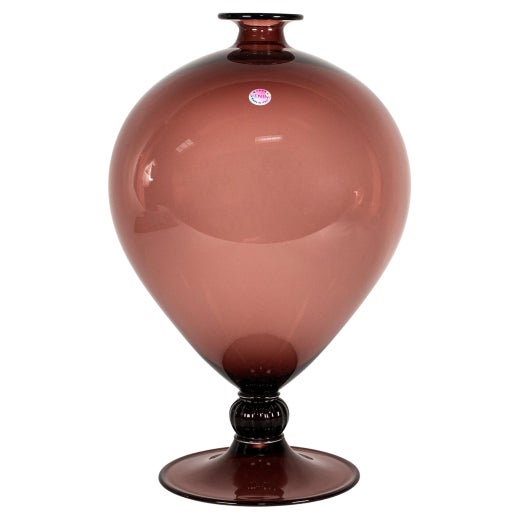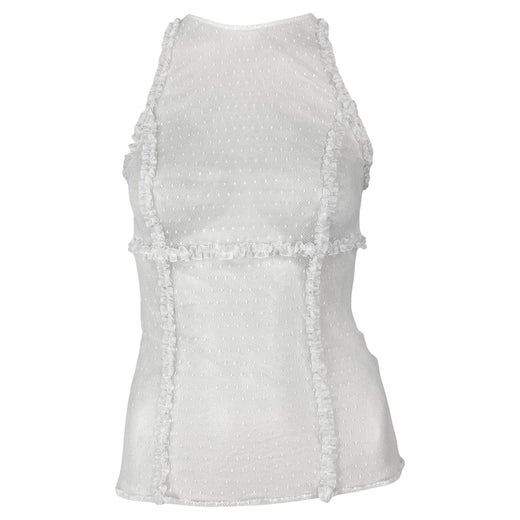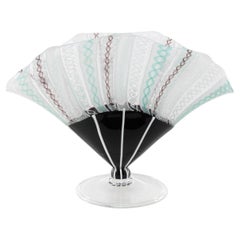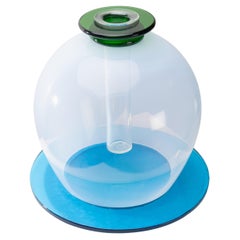Complete collection of vases designed by Gianni Versace - VENINI
About the Item
- Creator:Gianni Versace (Artist),Venini (Manufacturer)
- Dimensions:Height: 6.89 in (17.5 cm)Diameter: 10.24 in (26 cm)
- Sold As:Set of 7
- Style:Mid-Century Modern (Of the Period)
- Materials and Techniques:
- Place of Origin:
- Period:1990-1999
- Date of Manufacture:1996
- Condition:Wear consistent with age and use. Lit. : Original brochure. Each piece signed, dated and numbered where applicable. Each piece in a very good condition.
- Seller Location:Uccle, BE
- Reference Number:Seller: UI01SET1stDibs: LU2994343744452
Venini
Beginning in the 1930s — and throughout the postwar years especially — Venini & Co. played a leading role in the revival of Italy’s high-end glass industry, pairing innovative modernist designers with the skilled artisans who created extraordinary chandeliers, sconces and other lighting in the centuries-old glass workshops on the Venetian island of Murano.
While the company’s co-founder, Paolo Venini (1895–1959), was himself a highly talented glassware designer, his true genius was to invite forward-thinking Italian and international designers to Murano’s hallowed workshops to create Venini pieces — among them Gio Ponti, Massimo Vignelli, Finnish designer Tapio Wirkkala, Thomas Stearns of the United States and Fulvio Bianconi.
Paolo Venini trained and practiced as a lawyer for a time, though his family had been involved with glassmaking for generations. After initially buying a share in a Venetian glass firm — he and antiques dealer Giacomo Cappellin established Vetri Soffiati Cappellin Venini & C. in 1921 — Venini took over the company as his own in 1925, and under his direction, it produced mainly classical Baroque designs.
In 1932, Venini hired the young Carlo Scarpa— who would later distinguish himself as an architect — as his lead designer. Scarpa, working in concert with practiced glass artisans, completely modernized Venini, introducing simple, pared-down forms; bright primary colors; and bold patterns such as stripes, banding and abstract compositions that utilized cross sections of murrine (glass rods).
Paolo Venini’s best designs are thought to be his two-color Clessidre hourglasses, produced from 1957 onward, and the Fazzoletto (“handkerchief”) vase, designed with Bianconi in 1949. Bianconi’s masterworks are considered by many to be his Pezzato works — colorful vases with patterns that resemble those of a patchwork quilt.
Other noteworthy and highly collectible vintage Venini works include Ponti’s dual-tone stoppered bottles (circa 1948); rare glass sculptures from the Doge series by Stearns, the first American to design for the firm; Vignelli’s striped lanterns of the 1960s; the Occhi vases with eyelet-shaped patterns by Tobia Scarpa (son of Carlo); and, with their almost zen purity, the Bolle (“bubbles”) bottles designed by Wirkkala in 1968.
With these works — and many others by some of the creative titans of the 20th and 21st centuries — Venini has produced one of the truly great bodies of work in modern design.
Find antique and vintage Venini chandeliers, serveware, table lamps, decorative objects and other furniture on 1stDibs.
Gianni Versace
The signature extravagance of legendary fashion designer Gianni Versace — forever aligned with glamour, sex, celebrity and spectacle — can overshadow the Italian couturier’s broad and deep engagement with history and culture. Today, his vintage dresses and gowns, handbags, sunglasses and other accessories look astonishingly fresh and freshly relevant.
More than any designer before him, Versace mined celebrity, music and Pop art for inspiration, and his subversive, maximalist and unabashedly seductive designs infused high fashion with an entirely new ethos. “I don’t believe in good taste,” he once explained. Instead, he had a sexy good time with fashion — as he did with life.
Gianni Versace was born in Calabria, Italy. His mother was a successful dressmaker who employed more than 40 seamstresses. As a child, little Gianni marveled at her workshop, which would become a university of sorts, where he learned the exceptional construction techniques that were at the foundation of his creative expression.
In 1972, at age 25, he moved to Milan to work in fashion. He launched his first collection — and his label — in 1978, with his older brother Santo managing the business concerns. Soon, sister Donatella, whom Gianni dressed and took to discos when she was still a child, joined the family venture, where she had a creative role and managed enormously popular ready-to-wear lines such as Versus.
Vintage Versace — and Gianni Versace Couture, which debuted in 1989 — has become catnip for modern fashion enthusiasts who seek out the now-iconic house codes that originated in the designs of the 1980s and 1990s. His glamorous and seductive apparel — the clingy skirts and slender, strappy party dresses, as well as the erotic magazine ads that publicized them — looms large, but Versace’s art and historical influences were also vast.
Versace was an art collector, and he took on commissions to create costumes for theatrical performances during the 1980s and spoke of looking to numerous cultures for inspiration. The New York Times noted in 1997 that the fashion industry “is now driven by contemporary culture because Mr. Versace made it that way.”
Insiders consider his 1991/1992 Autumn/Winter runway show — which featured supermodels Christy Turlington, Cindy Crawford, Naomi Campbell and Linda Evangelista lip-synching George Michael’s “Freedom” — as the moment when the two worlds of fashion and pop culture became one, changing both forever.
Versace's adventurous spirit of design resulted in his creating jewel-toned prints rooted in Grecian motifs, Etruscan symbols, the Italian Baroque and Andy Warholʼs Marilyn Monroe. There were slinky dresses in Oroton, his patented chain-mail textile that draped like satin, and leather bondage ensembles. Sex sold, for both women and men. Wrote the late curator Richard Martin, “[Versace] became the standard-bearer of gay men’s fashion because he eschewed decorum and designed for desire.”
Following Versace’s tragic murder in 1997, Donatella took over the role of artistic director and continued to evolve the house codes with a twist of her feminine and feminist perspective. Today, Santo Versace is chief executive officer of Versace and Donatella is its chief creative officer.
Browse an extraordinary collection of vintage Gianni Versace evening dresses, handbags, day dresses and more on 1stDibs.
You May Also Like
2010s Italian Mid-Century Modern Vases
Murano Glass
Late 20th Century German Neoclassical Revival Vases
Porcelain
Vintage 1980s Italian Vases
Murano Glass
Late 20th Century Neoclassical Revival Vases
Porcelain
Late 20th Century Italian Mid-Century Modern Planters, Cachepots and Jar...
Art Glass, Murano Glass
2010s Italian Mid-Century Modern Vases
Murano Glass
2010s Italian Post-Modern Vases
Murano Glass
2010s Italian Post-Modern Vases
Murano Glass
Mid-20th Century Italian Mid-Century Modern Vases
Art Glass, Murano Glass
Late 20th Century Italian Mid-Century Modern Vases
Art Glass
More From This Seller
View AllMid-20th Century Italian Mid-Century Modern Vases
Art Glass
Mid-20th Century Italian Mid-Century Modern Vases
Blown Glass
Vintage 1950s Italian Mid-Century Modern Vases
Blown Glass
Vintage 1950s Italian Mid-Century Modern Vases
Art Glass, Murano Glass
Vintage 1950s Italian Mid-Century Modern Vases
Blown Glass
Mid-20th Century Italian Mid-Century Modern Vases
Blown Glass





